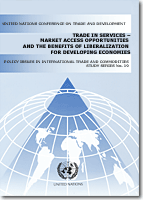
The service sector is the most important sector for most developing economies. It is the largest contributor to gross domestic product, production and employment. Since it is such an important sector, developing economies need to identify their comparative advantage in services and potential export markets.
Developing economies have a comparative advantage in labour services. They have an abundance of low and semi-skilled labour that is a major input into tourism, construction and transport services. New potential export opportunities are also emerging in communications and computer services. However, the export of many of these services is limited by many restrictions on the temporary movement of labour imposed by their trading partners through domestic regulation. Developing economies can improve their export revenues by specifically identifying these restrictions and, where a movement of labour is required, promote the benefits to potential export markets of services trade liberalization.
Developing economies are projected to be better off by US$ 130 billion from services trade liberalization. Consistent with similar modelling exercises for trade in goods, while there are some benefits from improving market access to foreign markets, most of the benefits come for liberalizing one´s own market. As developing economies remove their restrictions, their service sectors develop, primarily funded by foreign direct investment, and they become major exporters of services. The main restrictions on service suppliers that are preventing developing economies from realizing these benefits are limits on foreign direct investment, stringent licensing requirements and restrictions on expanding operations.



